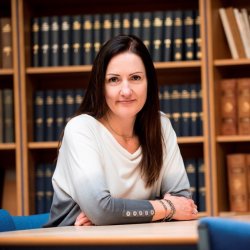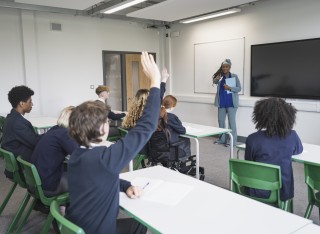
Dr Anna Cook
About
Biography
I am a Developmental Psychologist specialising in neurodiversity and in particular, the improvement of access to education for autistic children and young people. Previous roles include Senior Research Fellow for the Centre for Teachers and Teaching Research at UCL Institute of Education and Teaching Fellow in Developmental Psychology at the University of Surrey. My PhD thesis (completed 2019) investigated factors influencing vulnerability to peer rejection and bullying of autistic children and young people. Current projects evaluate the effectiveness of school inclusion models and interventions designed to increase understanding and improve access to education for autistic young people.
News
In the media
ResearchResearch interests
Arising from the pressing need to enhance understanding and acceptance of diversity in education, my research evaluates the effectiveness of different models of inclusion and interventions designed to increase understanding and improve access to education for autistic children and young people. I also explore the connections between perspectives on neurodiversity, reflective thinking, and teachers' capacity to implement inclusive principles. This unique approach goes beyond existing research to encompass broader socio-critical perspectives. Committed to inclusive research, I prioritize co-production and active participant involvement in my autism research. By valuing diverse perspectives, my work strives for authenticity, relevance, and positive societal impact.
Research projects
This project is funded by the ESRC New Investigator Grant and runs from 2024-2027. There is a growing need to improve understanding and acceptance of difference within education. The way teachers think about neurodiversity may affect their capacity and willingness to adopt an inclusive approach in their teaching. Confidence to meet the needs of all pupils can be a challenge at the start of a teacher’s career, but conceptualising difference as impairment results in less willingness to adapt teaching practices to cater for all. This can have damaging consequences for pupils’ mental health and lead to higher rates of permanent and fixed-term exclusions. This project explores connections between conceptualisations of neurodiversity, reflective thinking, and ECTs’ capacity to adopt inclusive principles in neurodiverse classrooms.
NAS Evaluation of Cullum CentresThis project (running from 2021-2024) is funded by the Cullum Family Trust and the National Autistic Society (NAS) to evaluate specialist resource centres in five mainstream schools in the South East of England for autistic pupils aged 11 to 16. Understanding how autistic children can be supported and included most effectively will provide the opportunity to educate and inform decision makers to effect change for future generations of children.
Autism Education Trust – Monmouthshire Autism Schools Programme EvaluationFunded by the Autism Education Trust (AET) this two-year project (2023-25) explores the effectiveness of their training and resource approach, and new Welsh language-adapted resources within the devolved nation. The programme aims to upskill and support the education workforce across 44 schools in Monmouthshire, creating positive and inclusive education for autistic children and young people and collaborative experiences of education settings for parents. The evaluation will assess whether these objectives have been achieved.
Research interests
Arising from the pressing need to enhance understanding and acceptance of diversity in education, my research evaluates the effectiveness of different models of inclusion and interventions designed to increase understanding and improve access to education for autistic children and young people. I also explore the connections between perspectives on neurodiversity, reflective thinking, and teachers' capacity to implement inclusive principles. This unique approach goes beyond existing research to encompass broader socio-critical perspectives. Committed to inclusive research, I prioritize co-production and active participant involvement in my autism research. By valuing diverse perspectives, my work strives for authenticity, relevance, and positive societal impact.
Research projects
This project is funded by the ESRC New Investigator Grant and runs from 2024-2027. There is a growing need to improve understanding and acceptance of difference within education. The way teachers think about neurodiversity may affect their capacity and willingness to adopt an inclusive approach in their teaching. Confidence to meet the needs of all pupils can be a challenge at the start of a teacher’s career, but conceptualising difference as impairment results in less willingness to adapt teaching practices to cater for all. This can have damaging consequences for pupils’ mental health and lead to higher rates of permanent and fixed-term exclusions. This project explores connections between conceptualisations of neurodiversity, reflective thinking, and ECTs’ capacity to adopt inclusive principles in neurodiverse classrooms.
This project (running from 2021-2024) is funded by the Cullum Family Trust and the National Autistic Society (NAS) to evaluate specialist resource centres in five mainstream schools in the South East of England for autistic pupils aged 11 to 16. Understanding how autistic children can be supported and included most effectively will provide the opportunity to educate and inform decision makers to effect change for future generations of children.
Funded by the Autism Education Trust (AET) this two-year project (2023-25) explores the effectiveness of their training and resource approach, and new Welsh language-adapted resources within the devolved nation. The programme aims to upskill and support the education workforce across 44 schools in Monmouthshire, creating positive and inclusive education for autistic children and young people and collaborative experiences of education settings for parents. The evaluation will assess whether these objectives have been achieved.
Supervision
Postgraduate research supervision
I supervise Masters, PsychD and PhD students.
Teaching
I am a guest lecturer on the undergraduate courses Psychology and Education, Developmental Psychology with Research Methods, General Psychology and the Foundation Course module Psychology in the Real World.
Publications
Autistic university students face extra challenges in both their academic and social life. Barriers to socialising appear to be less well understood and supported by universities than academic requirements. Semi-structured interviews were conducted with ten autistic university students to explore their social experiences. Questions explored their social experiences, satisfaction with social life, disclosure of ASD to others, and the impact of mental wellbeing on university life. Thematic analysis indicated most participants were unsatisfied with their social lives and experienced mental health issues. Factors exacerbating social isolation included lack of suitable social events, lack of social support and feeling unable to disclose to peers. Factors which reduced social isolation included joining an autism or special interest society and receiving social mentoring.
